Income Tax Return of an Estate - Form 1041
The illustrations of Form 1041 and the related schedules for 2002 appear near the end of this publication. These illustrations are based on the information that follows.
2002 income tax return. Having determined the tax liability for your father's final return, you now figure the estate's taxable income. You decide to use the calendar year and the cash method of accounting to report the estate's income. This return also is due by April 15, 2003.
In addition to the amount you received from your father's employer for unpaid salary and for vacation pay ($12,000) entered on line 8 (Form 1041), you received a dividend check from the XYZ Company on June 17, 2002. The check was for $750 and you enter it on line 2 (Form 1041). The estate received a Form 1099-INT showing $2,250 interest paid by the bank on the savings account in 2002 after your father died. Show this amount on line 1 (Form 1041).
In September, a local coin collector offered you $3,000 for your father's coin collection. Your mother was not interested in keeping the collection, so you accepted the offer and sold him the collection on September 23, 2002.
The estate has a gain from the sale of the collection. You will have to report the sale on Schedule D (Form 1041) when you file the income tax return of the estate. The estate has a capital gain of $200 from the sale of the coins. The gain is the excess of the sale price, $3,000, over the value of the collection at the date of your father's death, $2,800. See Gain (or loss) from sale of property under Income Tax Return of an Estate - Form 1041 and its discussion, Income To Include, earlier.
Deductions. In November 2002, you received a bill for the real estate taxes on the home. The bill was for $2,250, which you paid. Include real estate taxes on line 11 (Form 1041). Real estate tax on the rental property was $700; this amount, however, is reflected on Schedule E (Form 1040).
You paid $325 for attorney's fees in connection with administration of the estate. This is an expense of administration and is deducted on line 14 (Form 1041). You must, however, file with the return a statement in duplicate that such expense has not been claimed as a deduction from the gross estate for figuring the federal estate tax on Form 706, and that all rights to claim that deduction on Form 706 are waived.
Distributions. You made a distribution of $2,000 to your father's brother, James. The distribution was made under the terms of the will from current income of the estate.
The income distribution deduction ($2,000) is figured on Schedule B of Form 1041 and deducted on line 18 (Form 1041).
The distribution of $2,000 must be allocated and reported on Schedule K-1 (Form 1041) as follows:
Step 1 Allocation of Income & Deductions
Type of Income
|
Amount
|
Deductions
|
Distributable Net Income
|
Interest (15%)
|
$ 2,250
|
(386)
|
$ 1,864
|
Dividends (5%)
|
750
|
(129)
|
621
|
Other Income (80%)
|
12,000
|
(2,060)
|
9,940
|
Total
|
$15,000
|
(2,575)
|
$12,425
|
Step 2 Allocation of Distribution (Report on the Schedule K-1 for James)
Line 1 - Interest ($2,000 × 1,864/12,425)
|
$300
|
Line 2 - Dividends ($2,000 × 621/12,425)
|
100
|
Line 5a - Other Income
|
|
($2,000 × 9,940/12,425)
|
1,600
|
Total Distribution
|
$2,000
|
The estate took an income distribution deduction, so you must prepare Schedule I (Form 1041), Alternative Minimum Tax, regardless of whether the estate is liable for the alternative minimum tax.
The other distribution you made out of the assets of the estate in 2002 was the transfer of the automobile to your mother on July 1. This is included in the bequest of property, so it is not taken into account in computing the distributions of income to the beneficiary. The life insurance proceeds of $275,000 paid directly to your mother by the insurance company are treated as a specific sum of money transferred to your mother under the terms of the will.
Tax computation. The taxable income of the estate for 2002 is $10,025, figured as follows:
Gross income:
|
Income in respect of a decedent
|
|
$12,000
|
Dividends
|
|
750
|
Interest
|
|
2,250
|
Capital gain
|
|
200
|
|
|
$15,200
|
Minus: Deductions and income distribution
|
Real estate taxes
|
$2,250
|
|
Attorney's fee
|
325
|
|
Exemption
|
600
|
|
Distribution
|
2,000
|
5,175
|
Taxable income
|
$10,025
|
The estate had a net capital gain and taxable income, so you use Part V of Schedule D (Form 1041) and the Schedule D Tax Worksheet to figure the tax, $2,826, for 2002.
Note. For purpose of this example, we have illustrated the filled-in worksheet. You would not file the worksheet with the return. You would keep the worksheet for your records.
2003 income tax return for estate. On January 7, 2003, you receive a dividend check from the XYZ Company for $500. You also have interest posted to the savings account in January totaling $350. On January 28, 2003, you make a final accounting to the court and obtain permission to close the estate. In the accounting, you list $1,650 as the balance of the expense of administering the estate.
You advise the court that you plan to pay $5,000 to Hometown Church, under the provisions of the will, and that you will distribute the balance of the property to your mother, the remaining beneficiary.
Gross income. After making the distributions already described, you can wind up the affairs of the estate. The gross income of the estate for 2003 is more than $600, so you must file an income tax return, Form 1041, for 2003 (not shown). The estate's gross income for 2003 is $850 (dividends $500 and interest $350).
Deductions. After making the following computations, you determine that none of the distributions made to your mother must be included in her taxable income for 2003.
Gross income for 2003:
|
Dividends
|
$500
|
Interest
|
350
|
|
|
$850
|
Less deductions:
|
Administration expense
|
$1,650
|
Loss
|
($800)
|
Note that because the contribution of $5,000 to Hometown Church was not required under the terms of the will to be paid out of the gross income of the estate, it is not deductible and was not included in the computation.
The estate had no distributable net income in 2003, so none of the distributions made to your mother have to be included in her gross income. Furthermore, because the estate in the year of termination had deductions in excess of its gross income, the excess of $800 will be allowed as a miscellaneous itemized deduction subject to the 2%-of-adjusted-gross-income limit to your mother on her individual return for the year 2003, if she itemizes deductions.
Termination of estate. You have made the final distribution of the assets of the estate and you are now ready to terminate the estate. You must notify the IRS, in writing, that the estate has been terminated and that all of the assets have been distributed to the beneficiaries. Form 56 can be used for this purpose. Be sure to report the termination to the IRS office where you filed Form 56 and to include the employer identification number on this notification.
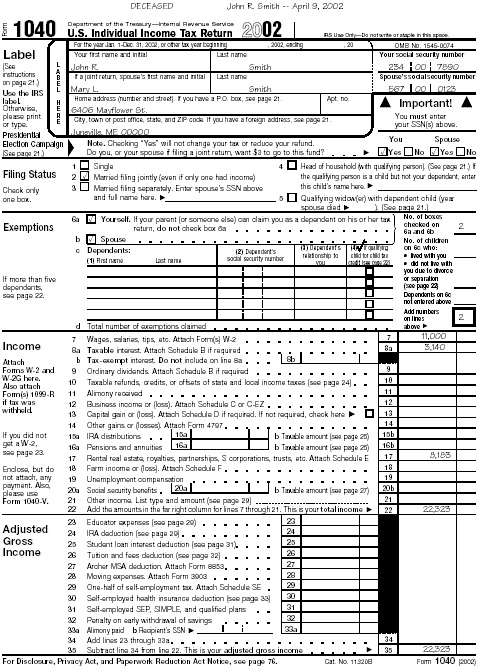
Page 1 of Form 1040 for John R. Smith
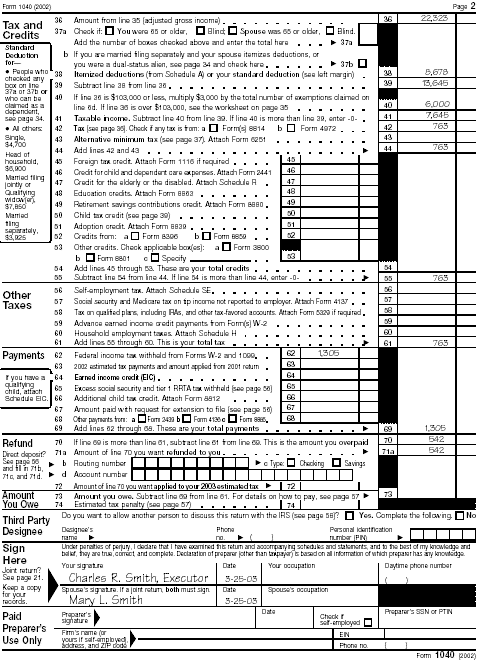
Page 2 of Form 1040 for John R. Smith
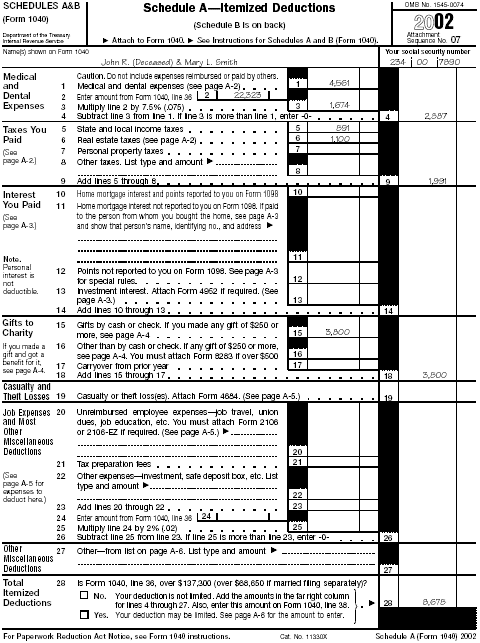
Schedule A (Form 1040) for John R. Smith
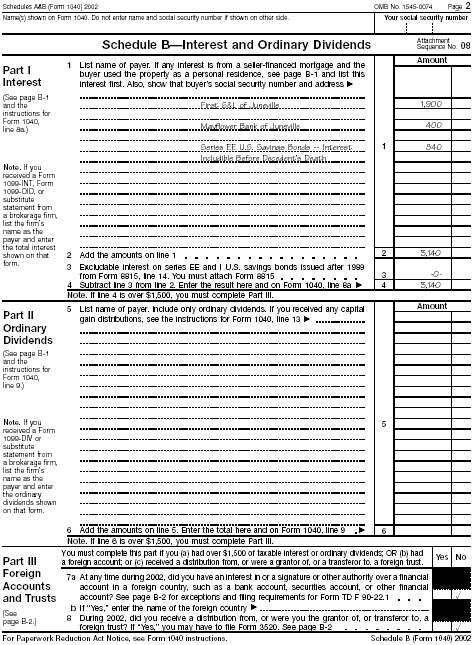
Schedule B (Form 1040) for John R. Smith
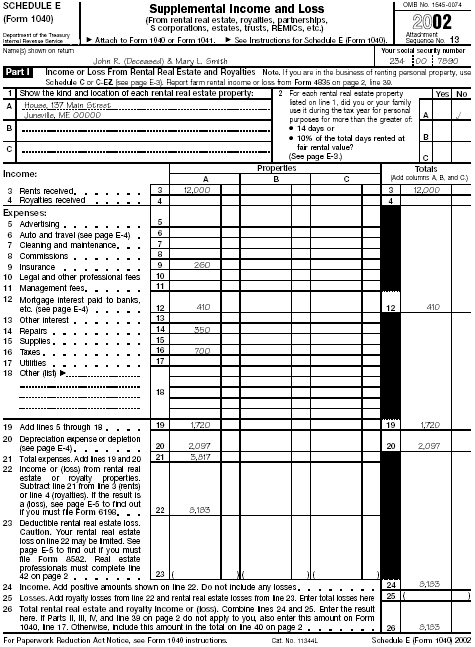
Schedule E (Form 1040) for John R. Smith
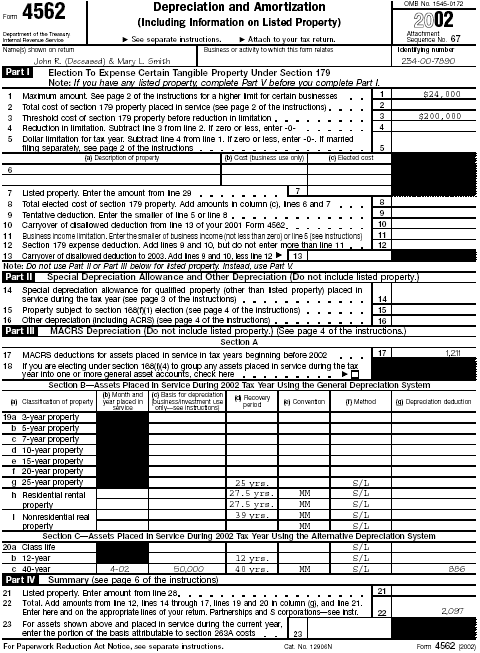
Form 4562 for John R. Smith
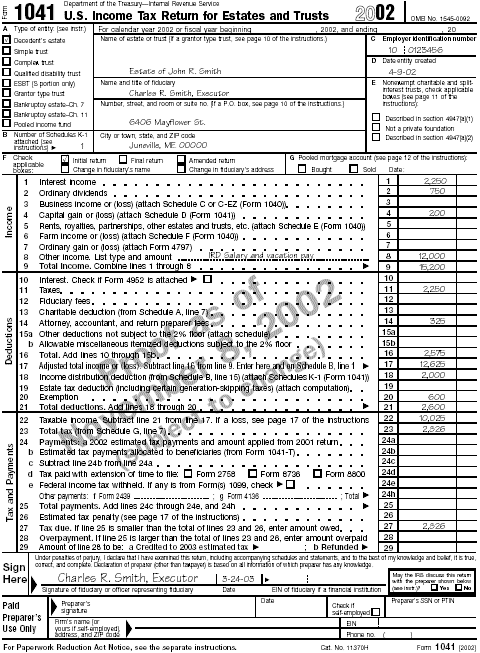
Form 1041 for the estate of John R. Smith
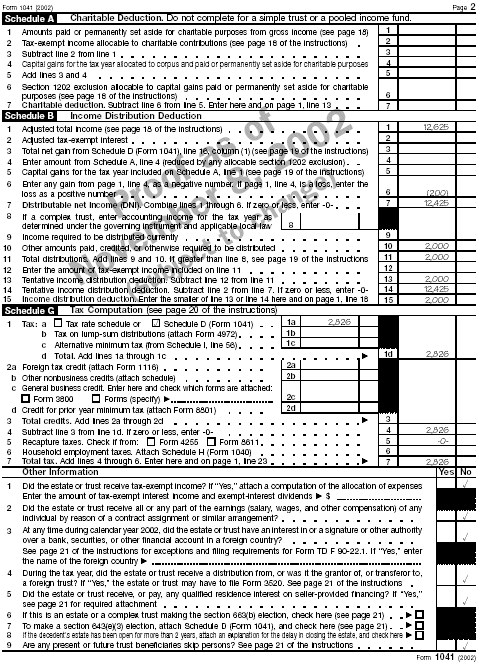
Page 2 of Form 1041 for the estate of John R. Smith
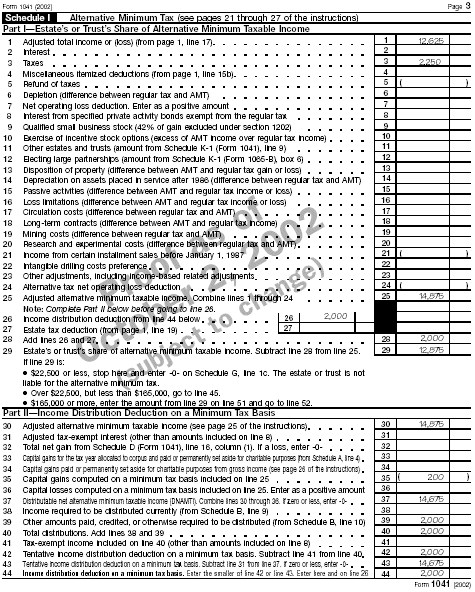
Page 3 of Form 1041 for the estate of John R. Smith
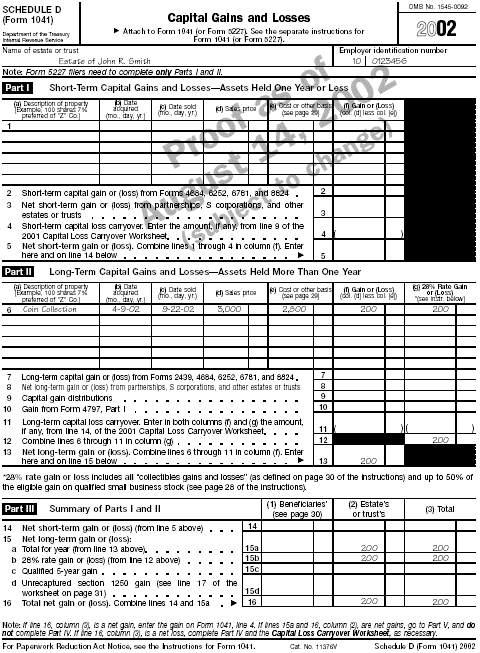
Page 1 of Schedule D (Form 1041) for the estate of John R. Smith
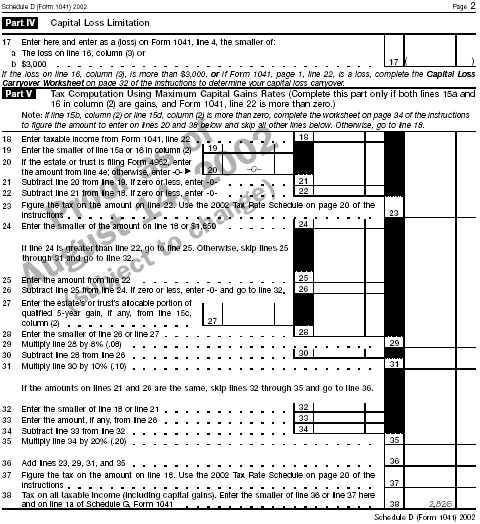
Page 2 of Schedule D (Form 1041) for the estate of John R. Smith
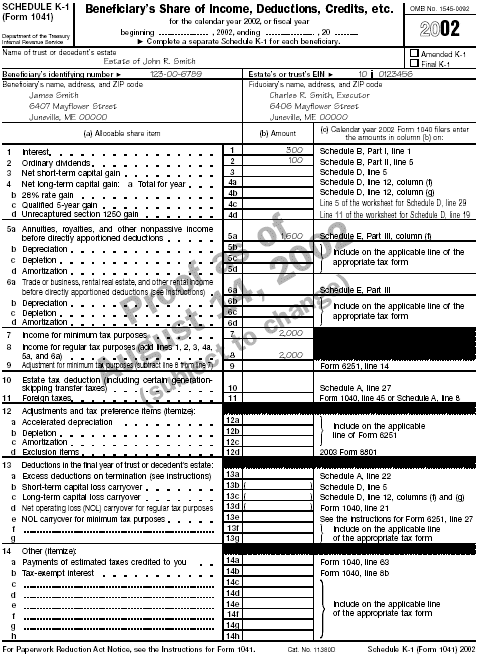
Schedule K-1 (Form 1041) for the estate of John R. Smith
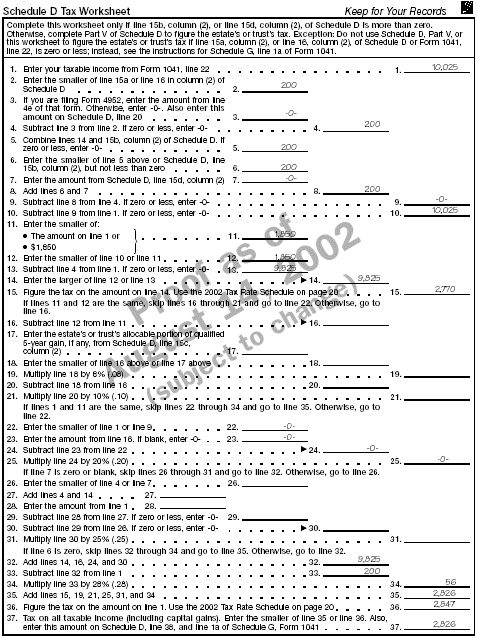
Schedule D Tax Worksheet
Table A. Checklist of Forms and Due Dates - For Executor, Administrator, or Personal Representative
Form No.
|
Title |
Due Date |
SS-4
|
Application for Employer Identification Number
|
As soon as possible. The identification number must be included in returns, statements, and other documents. |
56
|
Notice Concerning Fiduciary Relationship
|
As soon as all necessary information is available.*
|
706
|
United States Estate (and Generation-Skipping Transfer) Tax Return
|
9 months after date of decedent's death.
|
706-A
|
United States Additional Estate Tax Return
|
6 months after cessation or disposition of special-use valuation property.
|
706-CE
|
Certificate of payment of foreign Death Tax
|
9 months after decedent's death. To be filed with Form 706.
|
706-GS(D)
|
Generation-Skipping Transfer Tax Return for Distributions
|
See form instructions.
|
706-GS(D-1)
|
Notification of Distribution From a Generation-Skipping Trust
|
See form instructions.
|
706-GS(T)
|
Generation-Skipping Transfer Tax Return for Terminations
|
See form instructions.
|
706-NA
|
United States Estate (and Generation-Skipping Transfer) Tax Return, Estate of nonresident not a citizen of the United States
|
9 months after date of decedent's death.
|
712
|
Life Insurance Statement
|
Part I to be filed with estate tax return.
|
1040
|
U.S. Individual Income Tax Return
|
Generally, April 15th of the year after death.
|
1040NR
|
U.S. Nonresident Alien income Tax Return
|
See form instructions.
|
1041
|
U.S. Income Tax Return for Estates and Trusts
|
15th day of 4th month after end of estate's tax year.
|
1041-A
|
U.S. Information Return - Trust Accumulation of Charitable amounts
|
April 15th.
|
1041-T
|
Allocation of Estimated Tax Payments to Beneficiaries
|
65th day after end of estate's tax year.
|
1041-ES
|
Estimated Income Tax for Estates and Trusts
|
Generally, April 15, June 15, Sept. 15, and Jan. 15 for calendar-year filers.
|
1042
|
Annual Withholding Tax Return for U.S. Source Income of Foreign Persons
|
March 15th.
|
1042-S
|
Foreign Person's U.S. Source Income Subject to Withholding
|
March 15th.
|
1310
|
Statement of Person Claiming Refund Due a Deceased Taxpayer
|
See form instructions.
|
2758
|
Application for Extension of Time To File Certain Excise, Income, Information, and other Returns
|
Sufficiently early to permit IRS to consider the application and reply before the due date of Form 1041.
|
4768
|
Application for Extension of Time To File a Return and/or Pay U.S. Estate (and Generation-Skipping Transfer) Taxes
|
Sufficiently early to permit IRS to consider the application and reply before the estate tax form due date.
|
4810
|
Request for Prompt Assessment under Internal Revenue Code Section 6501(d)
|
As soon as possible after filing Form 1040 or Form 1041.
|
8300
|
Report of Cash Payments Over $10,000 Received in a Trade or Business
|
15th day after the date of the transaction.
|
8822
|
Change of Address
|
As soon as the address is changed.
|
* A personal representative must report the termination of the estate, in writing, to the Internal Revenue Service. Form 56 can be used for this purpose.
|
Table B. Worksheet To Reconcile Amounts Reported in Name of Decedent on Information Returns (Forms W-2, 1099-INT, 1099-DIV, etc.) (Keep for your records)
Name of Decedent
|
Date of Death
|
Decedent's Social Security Number
|
Name of Personal Representative, Executor, or Administrator
|
|
Estate's Employer Identification Number (If Any)
|
Source (list each payer)
|
A Enter total amount shown on information return
|
B Enter part of amount in column A reportable on decedent's final return
|
C Amount reportable on estate's or beneficiary's income tax return (column A minus column B)
|
D Part of column C that is income in respect of a decedent
|
1. Wages
|
|
|
|
|
2. Interest income
|
|
|
|
|
3. Dividends
|
|
|
|
|
4. State income tax refund
|
|
|
|
|
5. Capital gains
|
|
|
|
|
6. Pension income
|
|
|
|
|
7. Rents, royalties
|
|
|
|
|
8. Taxes withheld*
|
|
|
|
|
9. Other items, such as social security, business and farm income or loss, unemployment compensation, etc.
|
|
|
|
|
* List each withholding agent (employer, etc.)
|
Previous | First | Next
Publication Index | 2002 Tax Help Archives | Tax Help Archives | Home
